
Dhaka, the capital city of Bangladesh, is facing significant challenges in managing air and plastic pollution. The city’s rapid urbanisation and industrialisation have resulted in high levels of air pollution, while plastic waste has become a major environmental problem. As future leaders and professionals, students can play a crucial role in generating knowledge and solutions to these pressing environmental issues.
The Centre for Policy Dialogue (CPD) has undertaken a programme titled “Green Cities Initiative” which aims to understand the nexus between air and plastic pollution and the economy of Bangladesh, and make relevant policy recommendations. The Green Cities Initiative will focus on two broad thematic areas: i) air pollution; and ii) plastic pollution. The key objective of the study is to look at the drivers, impacts, and solutions with regard to air and plastic pollution in major cities of Bangladesh, and recommend policies to reduce both types of pollution. The Green Cities Initiative aims to make cities green and environment-friendly through the reduction of pollution from air and plastic.
As part of this study, CPD in collaboration with the Earth Club of North South University (NSU), organised a three-day Student Research Poster Exhibition and Contest with undergraduate and graduate students centered around air and plastic pollution. The objective of this student research poster exhibition and contest was to provide a platform for undergraduate and graduate students to showcase their research on air and plastic pollution in Dhaka city.
The competition unfolded through two distinct stages. The first stage involved an exhibition of research posters at NSU’s recreation hall on 23-24 August, 2023. During this time, students from multiple universities and diverse disciplines converged to unveil their findings regarding air and plastic pollution. As this phase concluded, a rigorous selection process identified six exceptional posters which were moved to the final round.

The final round took place at AUDI 801 within NSU campus on 27 August, 2023, where the six chosen posters were showcased to the esteemed judges. Each presenter explained their work, discussed their ideas, and defended their findings.

The Guest of Honour, Dr Fahmida Khatun, Executive Director, CPD, said ‘CPD organises programmes and events, fostering a platform for comprehensive discussions on policy recommendations. This competition exemplified our endeavor to stimulate the participation of young intellectuals, facilitating the exchange of their valuable perspectives and recommendations on air and plastic pollution.’
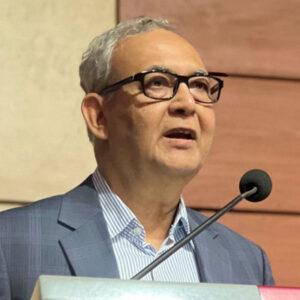
‘Contrary to a common misconception, Economics plays a significant role in environmental sustainability. It offers a range of vital tools that, when effectively applied, can contribute to pollution reduction’ said the Chair of the session, Dr M. Ismail Hossain, Professor, Department of Economics, and Former Pro-Vice Chancellor, NSU.
Dr Helal Ahammad, Professor, Department of Economics, Dean, School of Business and Economics, and Director, Economics Research Platform, NSU said, ‘It’s crucial to clearly explain to the decision makers why pollution reduction is essential and how we can go about achieving it.’
‘While achieving a completely pollution-free world might be challenging, our focus should remain on minimising pollution as much as possible’ said Dr Hasan Mahmud Reza, Professor, Department of Pharmaceutical Sciences, Dean, School of Health & Life Sciences, NSU.

Dr Asad Karim Khan Priyo, Associate Professor and Chair Department of Economics, NSU, recommended ‘We should establish incentive systems to encourage pollution reduction’.
‘Lives are being lost due to indoor air pollution, which can be up to 10 times more harmful than outdoor pollution’ said Dr Firoz Khan, Associate Professor, Department of Environmental Science and Management, NSU.
While discussing about plastic pollution, Dr Mohammad Sujauddin, Associate Professor and Chair, Department of Environmental Science and
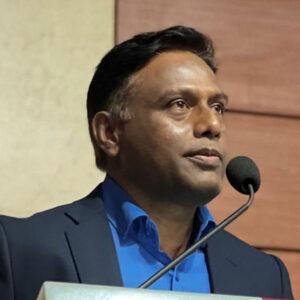
Management, NSU, said ‘When we suggest alternatives to plastic, like metal, it’s important to remember to take into account the carbon footprints of these alternatives as well’.
Mr Md Shiyan Sadik, Lecturer, Department of Environmental Science and Management, and Faculty Advisor, NSU Earth Club opined ‘The environment and economics can indeed converge to jointly pursue sustainability goals’.
‘We need people from all disciplines to come together and work on solutions to reduce pollution’ said Mr Syed Yusuf Saadat, Research Fellow, CPD.
Mr Muntaseer Kamal, Research Fellow, CPD said ‘In suggesting practical solutions for air and plastic pollution, it’s imperative to leverage the existing technology available to us.’
- Unchain the Air, Banish Plastic’s Snare! – Ahmad Shams Qadir
- Potential use of microbial enzymes for controlling plastic pollution in Bangladesh – Md. Sabbirul Hasan
- Exposing the Dangers of Improper Waste Management and Unhygienic Embankment that Cause Air and Plastic Pollution – Naznin Akter Nisa, Tahmid Israque Apurbo and Mahdy Mostafa Bhuiyan
- Trash to Treasure: Students recycling plastics into Teaching Learning Materials, Saving Dhaka city from Plastic Pollution – Noor E Lubna
- Air Pollution in Dhaka City: Its Sources, Impact And Mitigation – Rifa Tamanna & MD Shadman Sakib Chowdhury
- Pollution Revolution: How to Combate Air and Plastic Pollution – Shams Arban
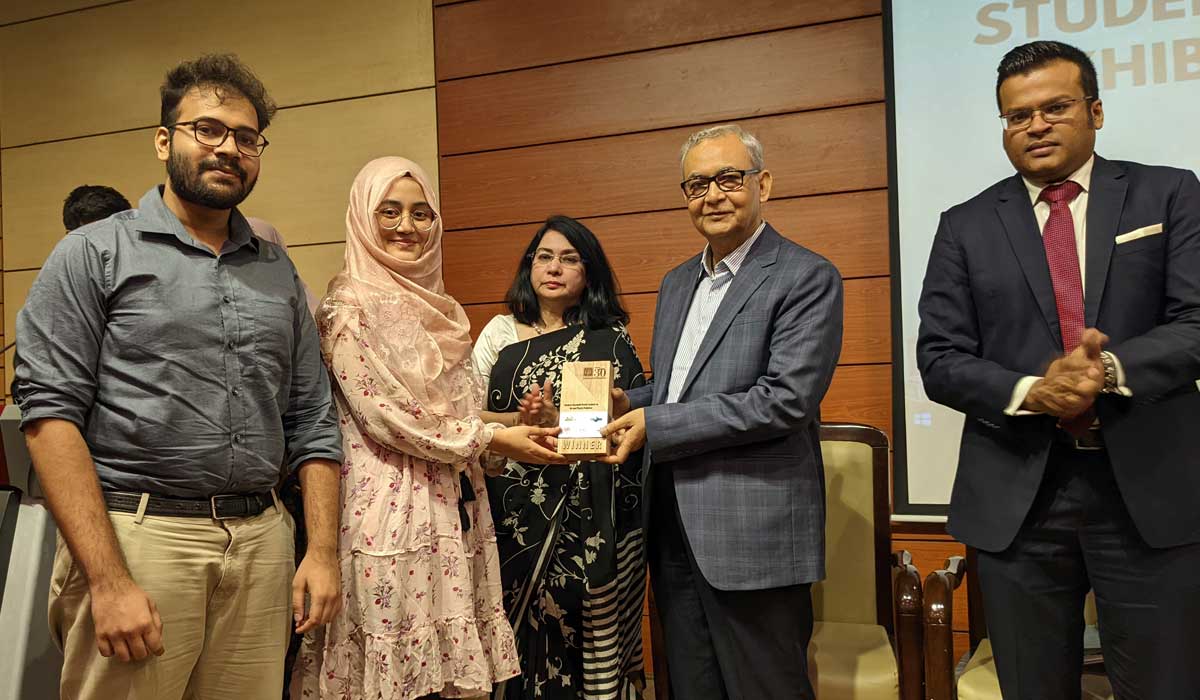
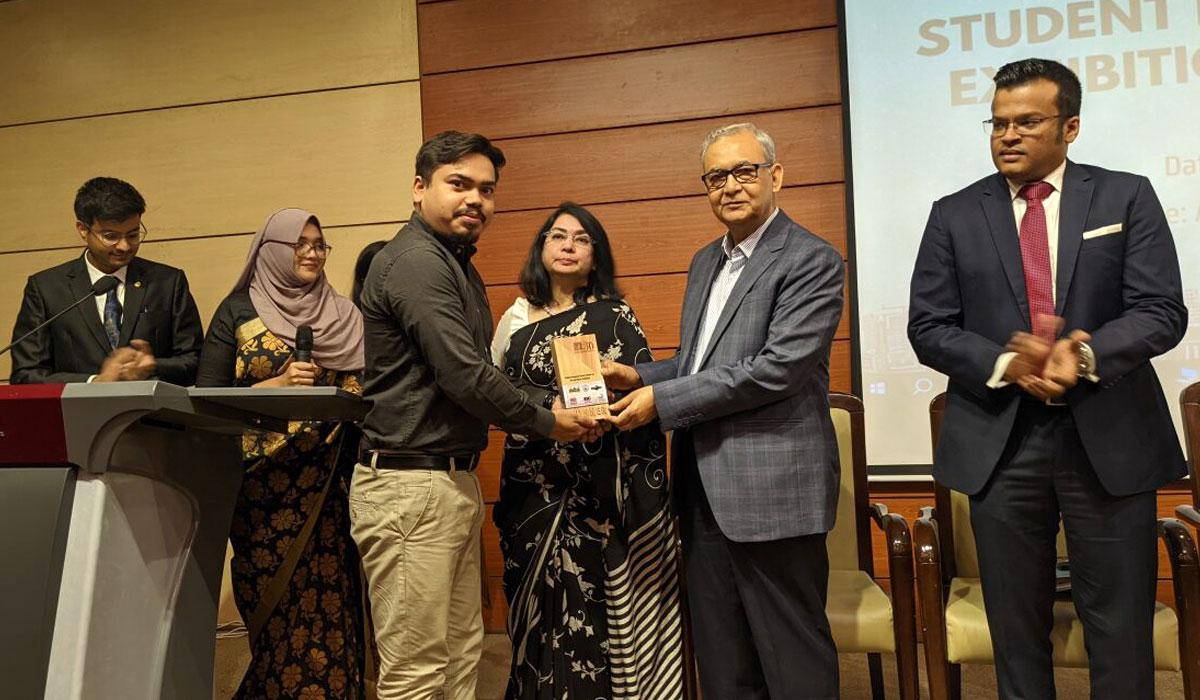

One of the joint first prizes of the contest was claimed by the poster on ‘Air Pollution in Dhaka City: Its Sources, Impact and Mitigation’ by Ms Rifa Tamanna and Md. Shadman Sakib Chowdhury of the department of Civil and Environmental Engineering, Bangladesh University of Engineering and Technology (BUET). They recommended that industries should aim to reduce use of enivornmentally harmful packaging materials. They also suggested that incentivising public transport will reduce use of private cars and hence reduce emission.

The other joint first prize was awarded to Md. Sabbirul Hasan of the department of Microbiology, NSU, for his poster titled ‘Potential Use of Microbial Enzymes for Controlling Plastic Pollution in Bangladesh’. He suggested that microbial degradation of plastics is better than chemical processes, burning or landfilling, because it consumes less energy and is an environment-friendly option for Bangladesh. But the diversity of microbes and enzymes that can degrade plastic is still limited. So, the future prospects include identification, isolation and modification of microbes against all the synthetic plastics.
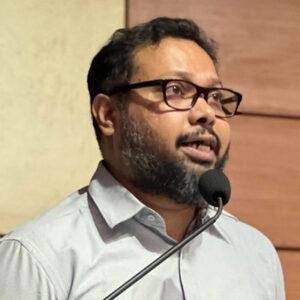
Among the participants, there were other noteworthy contributors who showcased insightful posters, delving into the pressing concerns of air and plastic pollution in Dhaka. These individuals were acknowledged for their valuable engagement and were presented with certificates in recognition of their efforts.
The poster titled ‘Unchain the Air, Banish Plastic’s Snare’ was presented by Mr Ahmad Shams Qadir of the department of Water Resources Engineering, BUET.
Focusing on the topic of recycling, Ms Noor -E -Lubna Asha of the department of Education, University of Dhaka (DU), presented her poster on ‘Trash to Treasure: Students Recycling Plastics into Teaching-learning Materials, Saving Dhaka City from Plastic Pollution’.

The poster on ‘Exposing the Dangers of Improper Waste Management and Unhygienic Embankment that Cause Air and Plastic Pollution: A Case Study in Mohammadpur, Dhaka’ was presented by Ms Naznin Akter Nisa of the department of Public Administration, Shahjalal University of Science and Technology.
The poster on ‘Pollution Revolution: How to Combat Air and Plastic Pollution’ was presented by Ms Shams Arban Ithila of the department of Geography and Environment Science, DU.
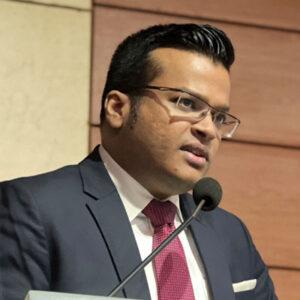
Researchers, academics and faculties were present at the contest, many of whom participated in the question and answer session and shared their insights.
This student research poster exhibition provided an opportunity for undergraduate and graduate students to showcase their research on air and plastic pollution in Dhaka. By fostering interdisciplinary collaborations and identifying potential solutions and policy recommendations,
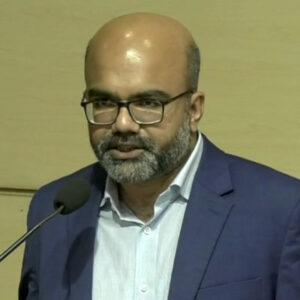
the poster exhibition contributed to the development of effective strategies for addressing air and plastic pollution in Dhaka. Moreover, it inspired and motivated future generations of students to engage in research and innovation to solve the most pressing environmental challenges of our time.
By the end of the poster exhibition and contest, the participants gained a better understanding of the current state of knowledge on air and plastic pollution in Dhaka. They also learned about innovative research methods and technologies for studying air and plastic pollution, and developed networks with peers and faculty members working on these issues. Moreover, the poster exhibition and contest identified potential solutions and policy recommendations for addressing air and plastic pollution in Dhaka, which can inform future research and policy decisions.

